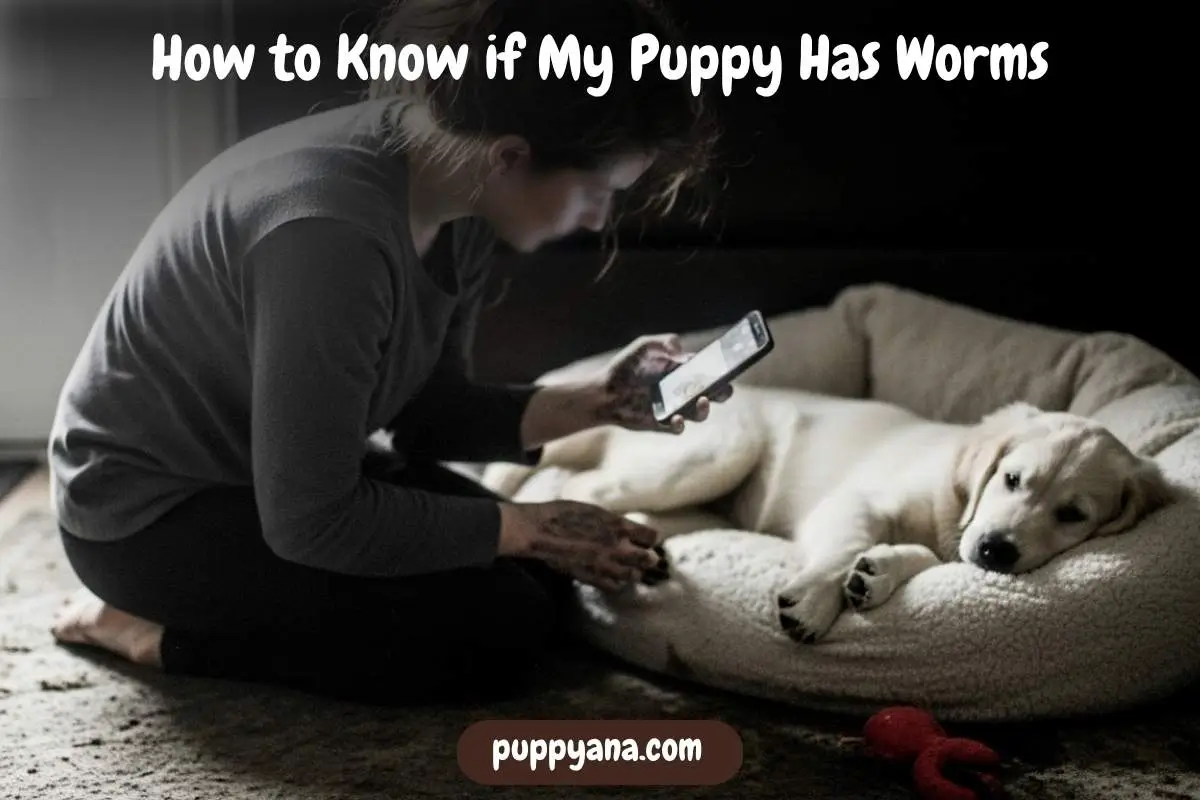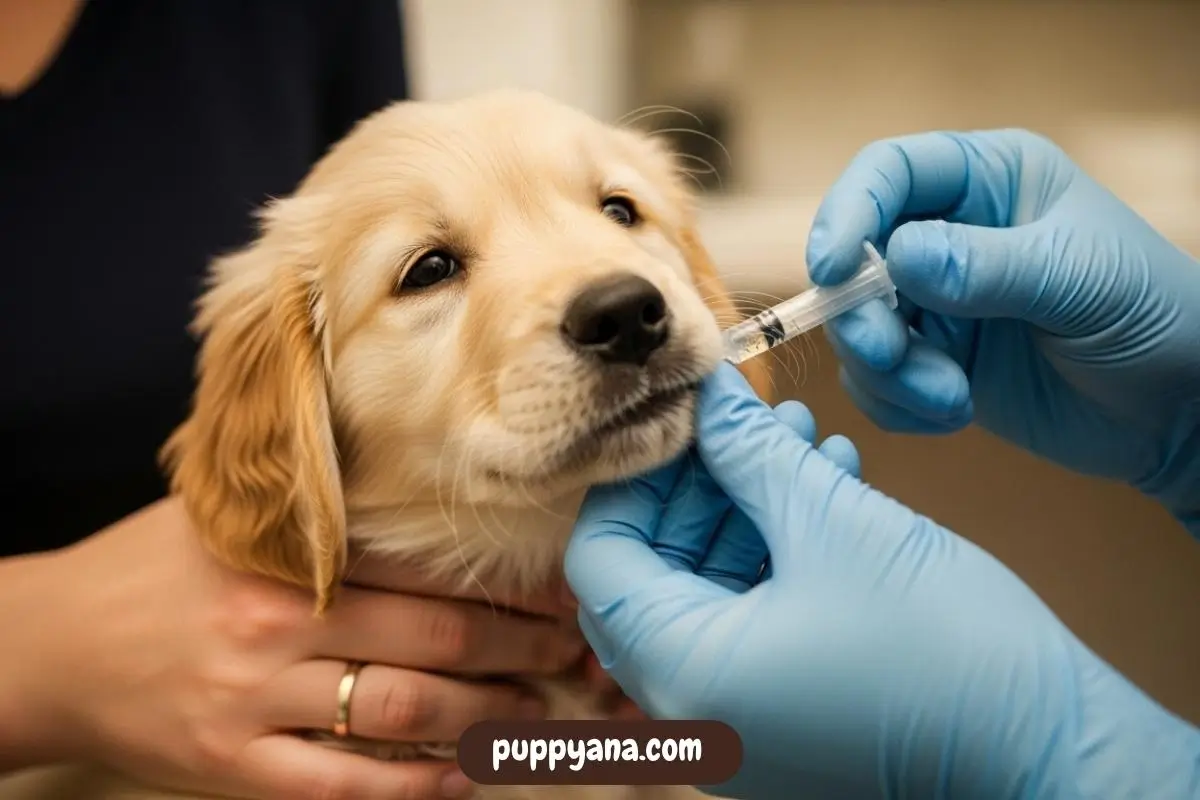Your puppy is growing, learning, and exploring everything, including things they shouldn’t. And that includes dirt, puddles, dead bugs… even poop.
If you’ve ever asked yourself, “How do I know if my puppy has worms?” you’re definitely not alone.
Worms are one of the most common health concerns in puppies, especially during their first 6 months. These internal parasites are easily picked up from the environment, their mother, or even other pets. But the signs aren’t always obvious.
In this guide, we’ll cover:
- The 9 most common symptoms of worms in puppies
- What different types of worms look like
- When to visit your vet
- How worm medicine works (and when to give it)
- Real-world prevention tips from puppy fosters, breeders, and trusted veterinary sources like VCA Hospitals, PetMD, and AKC
Let’s help your puppy stay safe, happy, and worm-free.

Table of Contents
ToggleQuick Answer: How to Know if Your Puppy Has Worms
You may suspect worms in your puppy if you notice:
- Visible worms or eggs in their poop
- A bloated or firm belly
- Diarrhea or soft stool
- Scooting or butt-dragging
- Unexplained weight loss
- More hunger but not gaining weight
- Coughing or low energy
- Stool that’s very smelly or mucousy
If you see actual worms or rice-like grains in poop, fur, or your floor, that’s a sure sign. But many puppies show symptoms without obvious worm sightings, which is why it’s important to know what to look for.
Why Puppies Are More Likely to Have Worms
Most puppies are born with roundworms passed from their mother before or shortly after birth. That’s why nearly every vet will tell you: puppy deworming should begin at 2–3 weeks old, even if you see no symptoms.
Puppies are especially at risk because:
- Their immune systems are still developing
- They explore the world by licking and chewing
- They roll in dirt, sniff poop, and eat things left on the ground
- They may be exposed to worms through their bedding, toys, or even shoes brought into the house
This is totally normal puppy behavior, but it opens the door to parasites.
According to the AKC, roundworms, hookworms, and tapeworms are among the most common culprits.
Most Common Signs of Worms in Puppies
Here are the 9 key signs that your puppy may have intestinal worms. Not all puppies show every symptom, and none of these alone confirm it, but together, they paint a strong picture.
1. Visible Worms in Poop or Around the Anus
You might see:
- Spaghetti-like worms (roundworms) in fresh stool
- Small white grains (tapeworm segments) in stool or around the rear
- Movement in the poop
If you have a backyard, always check the stool when cleaning up.
Real-life tip: I spotted tapeworm segments on a towel my foster pup had napped on. A vet check confirmed it, and treatment was quick and easy.
2. Bloated or Firm Belly
This is common in puppies with roundworms. They may look chubby but feel hard and distended, especially after eating.
3. Scooting or Dragging Rear on the Floor
This can be caused by worms (especially tapeworms) irritating the area around the anus.
Note: Sometimes scooting is caused by anal gland issues or itchy skin, not just worms. But in puppies, worms are a common cause.

4. Diarrhea or Soft Stool
Loose stool isn’t always from food changes. If it happens more than once or twice in a row, especially if it smells foul, is mucousy, or contains blood, get a checkup.
Worms inflame the intestines, reducing digestion and causing gastrointestinal upset.
5. Weight Loss or No Weight Gain
If your puppy eats well but still looks bony, worms may be stealing nutrients before your dog gets a chance to absorb them.
This sign is especially noticeable in fast-growing breeds between 8 and 16 weeks.
6. Dull Coat or Skin Problems
Some puppies start to look unkempt with less energy and coat shine. This result of poor nutrient absorption can signal a worm overload.
7. Coughing in Severe Cases
In advanced roundworm infections, the larvae migrate to the lungs, triggering coughing, retching, or trouble breathing.
This is less common but always needs a vet’s attention.
8. Licking or Chewing the Rear Excessively
If your puppy keeps trying to lick or bite their bottom, it could be from an itch caused by worms. Appetite and play may seem normal, but the discomfort in one area gives it away.
9. Mucus-Coated or Greasy-Looking Poop
Parasites irritate the intestinal lining. You may spot sticky, slimy, or shiny streaks on the stool, not just a loose texture.
If in doubt, bring a fecal sample to the vet for testing.
PuppyAna recommends monitoring poop each day during early development, not just for potty progress but as an early health indicator. It’s not glamorous—but it’s practical.
What Should Puppy Poop Look Like If They’re Healthy?
Paying close attention to stool is one of the easiest ways to catch illness, especially parasite problems, before they get serious.
Healthy puppy poop should be:
- Log-shaped (not runny or too dry)
- Chocolate brown (not greasy or yellow)
- Firm but easy to pick up
- No mucus, blood, or foul odor
- No visible objects (worms, rice-like grains)
Worm problems often cause poop that is:
- Pale or streaky (due to inflammation)
- Greasy or shiny (from poor digestion)
- Diarrhea that won’t clear in 24 hours
- Strong-smelling
- Mucusy or with visible worms
A client once texted me a picture of her puppy’s poop when it changed suddenly. That early report helped her catch a roundworm issue before behavior changes or weight loss started.
Checking your puppy’s poop every day sounds strange, but it is one of the fastest ways to safeguard their health.
How Puppies Get Worms
Puppies don’t need to eat poop to get worms, though some do. Here are the most common ways they’re exposed:
Common causes:
- Passed from mom to puppies before birth
- Nursing – some roundworms pass through milk
- Sniffing/eating infected dirt, poop, or dead animals
- Fleas – swallow a flea carrying tapeworm larvae
- Other animals – walking, boarding, or dog park visits
Even where you step matters. You can carry roundworm eggs home on your shoes.
The ASPCA shares this list of parasite prevention strategies, including vaccinations and clean housing.

Can Other Pets Catch Worms From an Infected Puppy?
If you have other dogs or cats at home, it’s normal to worry whether one infected puppy could spread worms to the rest of your household.
In many cases, yes: worms are contagious between pets, especially if they share poop areas, groom each other, or use the same bowls.
Common passing routes between pets:
- Infected poop or soil
- Shared litter boxes or outdoor potty areas
- Fleas (for tapeworms)
- Grooming each other’s fur or licking the same surfaces
- Eating the same food if worm eggs are present (rare but possible)
Some types, like whipworms and roundworms, can stay alive in soil for weeks or months. Even after treatment, infected areas must be cleaned, or your puppy can get reinfected, and so can your other pets.
Real-life tip: When I was fostering two puppies, only one showed worms in the fecal test, but both were treated immediately. We used separate crates and bowls temporarily just to be safe.
Use separate clean-up tools, bowls, and beds during treatment when possible. Talk to your vet about whether your other pets should be tested or treated at the same time.
What to Do If You Suspect Worms
The only way to confirm worms is a vet-administered fecal test. This checks for worm eggs under a microscope and guides treatment.
But here are steps you can take immediately:
✔️ What to do:
- Collect a fresh stool sample in a sealable bag
- Call your vet and describe any symptoms
- Avoid over-the-counter dewormers without a diagnosis
- Disinfect crate, bedding, and poop areas
Most treatment plans involve a deworming pill or liquid, often repeated 1–2 weeks later to kill any remaining larvae.
Deworming Schedule for Puppies
Preventative deworming is part of standard puppy care, even without symptoms.
Here’s the general schedule recommended by vets:
| Age | Deworming Schedule |
|---|---|
| 2, 4, 6, 8 weeks | * Deworm at each interval |
| 12–16 weeks | Repeat based on vet advice |
| At vet visits | Fecal test + treatment as needed |
| Every 6–12 months | For prevention in adult dogs |
Always follow your vet’s dosage based on weight. Giving too much or not enough can be risky or ineffective.

Can Indoor Puppies Still Get Worms?
Yes—even indoor-only or crate-trained puppies can get worms. People, shoes, fleas, and even grooming tools can bring parasites inside.
Common indoor worm exposure routes:
- Contaminated shoe soles after walks
- Dirty paws after backyard potty breaks
- Fleas or flea eggs from shared furniture
- Mother-to-puppy transmission (especially roundworms and hookworms)
- Contaminated indoor surfaces like shared crates or pet pads
Even if your puppy never leaves your home unsupervised, it’s impossible to make every environment parasite-proof.
This is why vets recommend routine fecal testing, even in puppies that appear healthy and well-contained.
When fostering a litter indoors, I once found eggs in a blanket during laundry day. Despite daily clean-up, a single stool accident was enough to spread the risk.
The goal isn’t perfection—it’s routine, awareness, and early treatment just in case.
How to Prevent Worms in Puppies Long-Term
Worm prevention includes a mix of hygiene, vet care, and environmental awareness.
Daily steps that make a difference:
- Remove poop from your yard within 24 hours
- Keep puppies away from standing water or public dog parks until fully vaccinated
- Bathe and wash paws after muddy or outdoor play
- Use regular flea prevention to stop tapeworm transmission
- Talk to your vet about monthly parasite protection (heartworm + internal worms)

Conclusion
Worms are common and treatable. Now that you know how to know if your puppy has worms, you can spot the signs early and take the right steps to protect your pup’s health.
Remember: even playful, happy puppies can carry worms with no obvious signs. That’s why puppy wellness care, clean routines, and regular fecal tests are essential.
Your attention now builds habits and health for life.
Frequently Asked Questions
Can I see worms in my puppy’s poop with the naked eye?
Yes, roundworms and tapeworm segments can be visible. But eggs are microscopic and require a fecal exam.
Can I treat worms at home without the vet?
It’s not recommended. Over-the-counter meds may not treat the right type or stage of worm, and side effects are possible without dosage guidance.
Do all puppies get worms?
Most are born with some type. That’s why early worming is standard care from responsible breeders, shelters, and rescues.
Can my puppy give me worms?
Yes, some worms (like roundworms or hookworms) can pass to humans, especially children. This is rare but possible without good hygiene.
How quickly do dewormers work?
Many start killing worms within 24–48 hours. It may take a few days for full improvement in stool and behavior.





